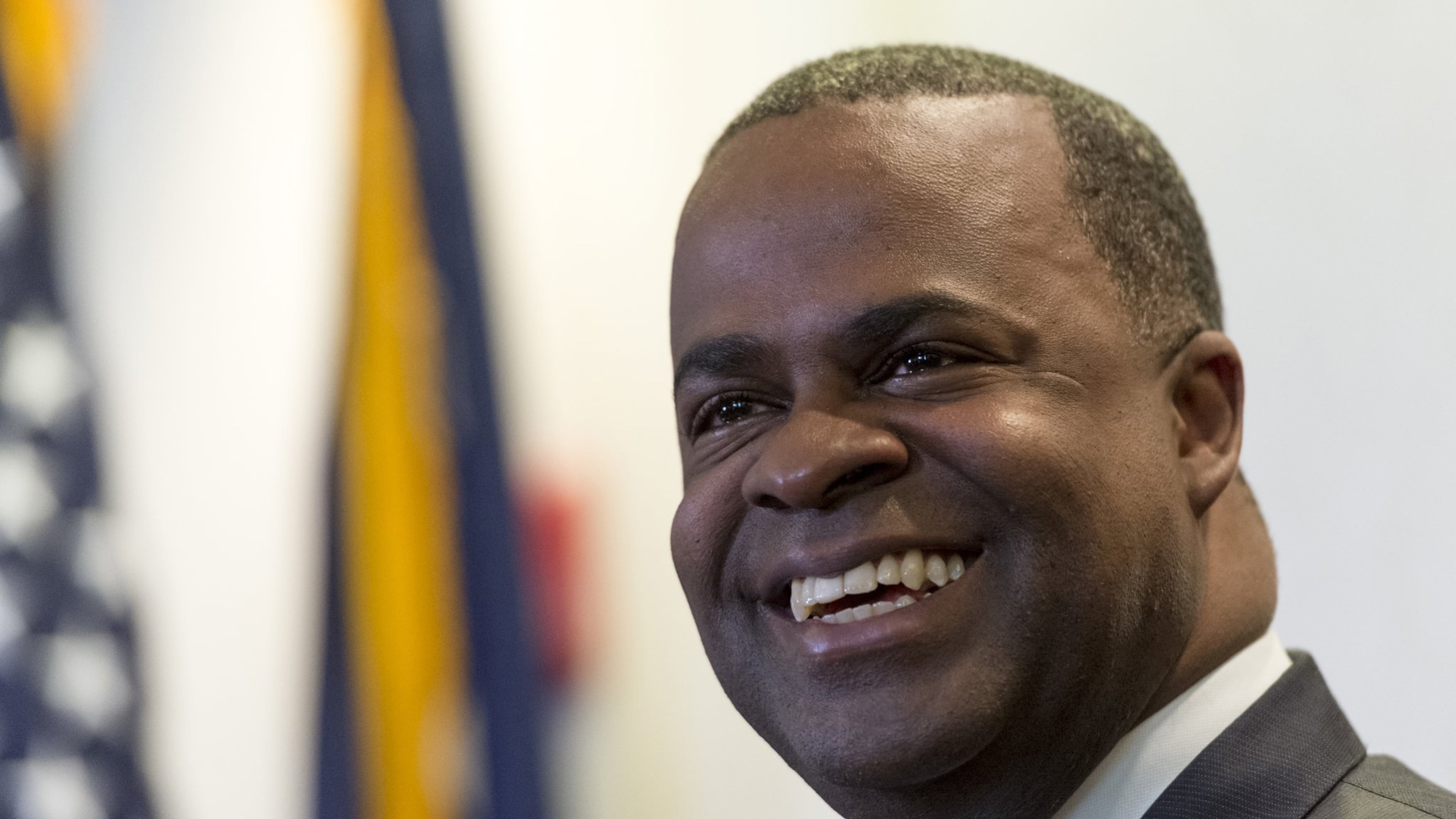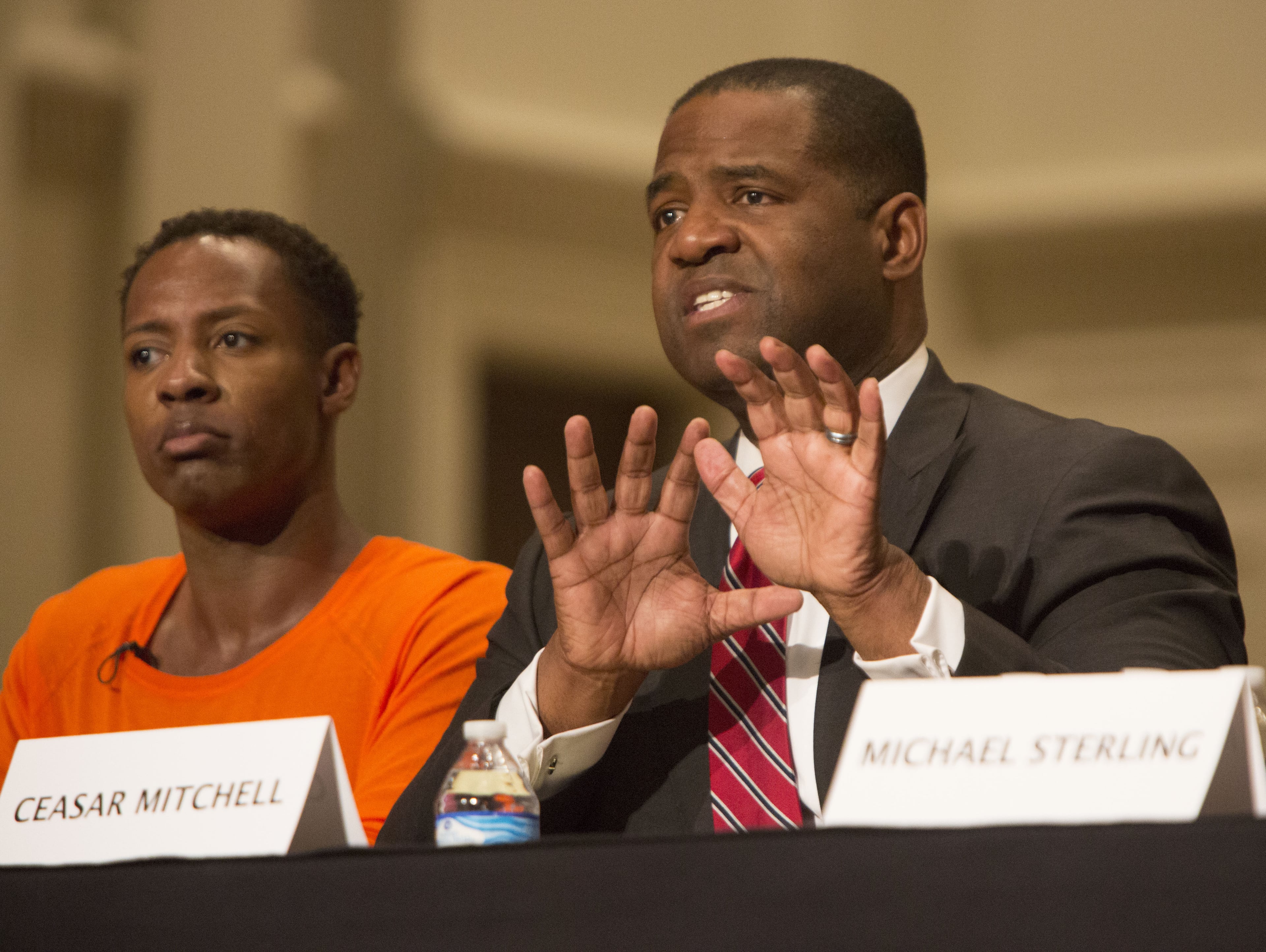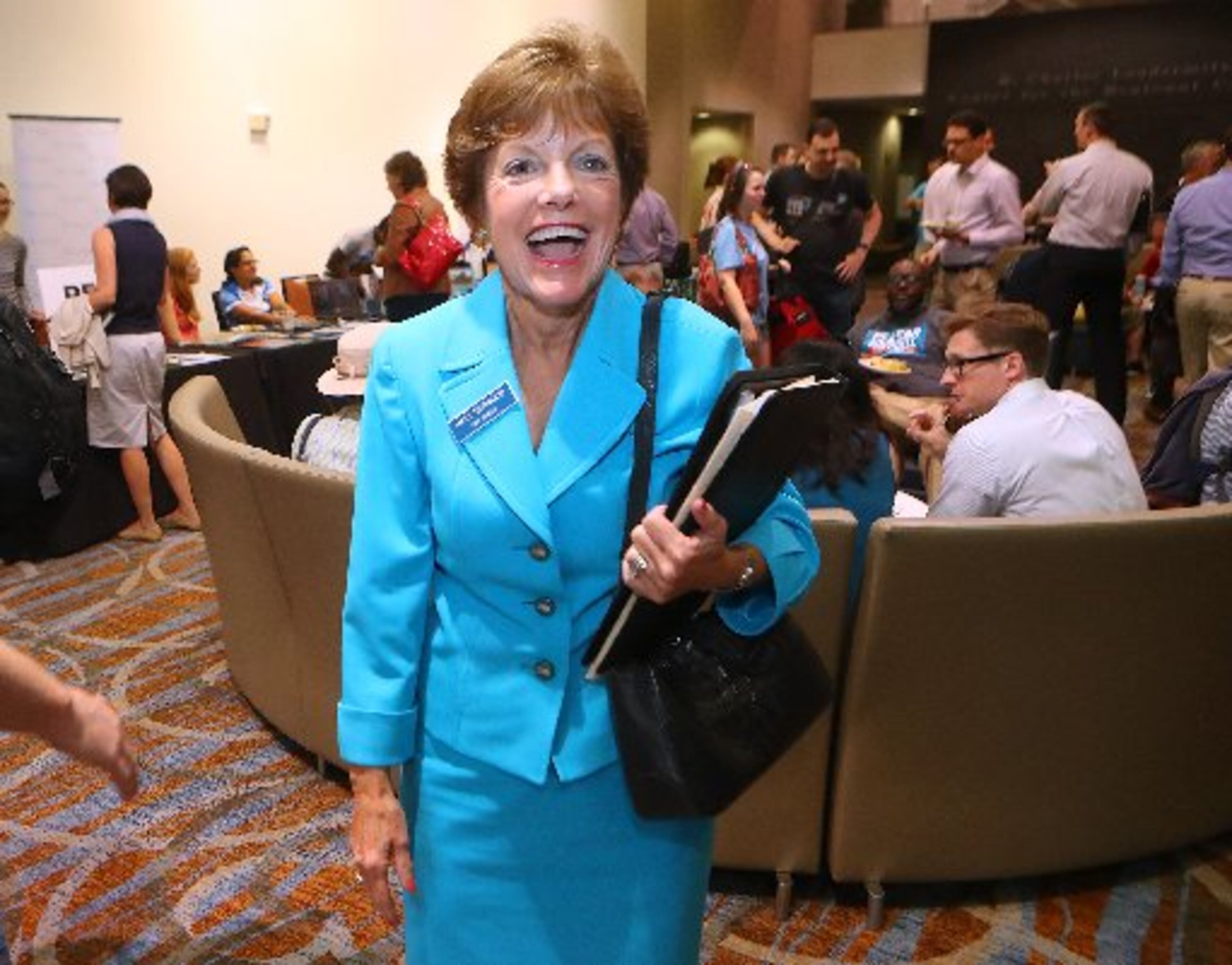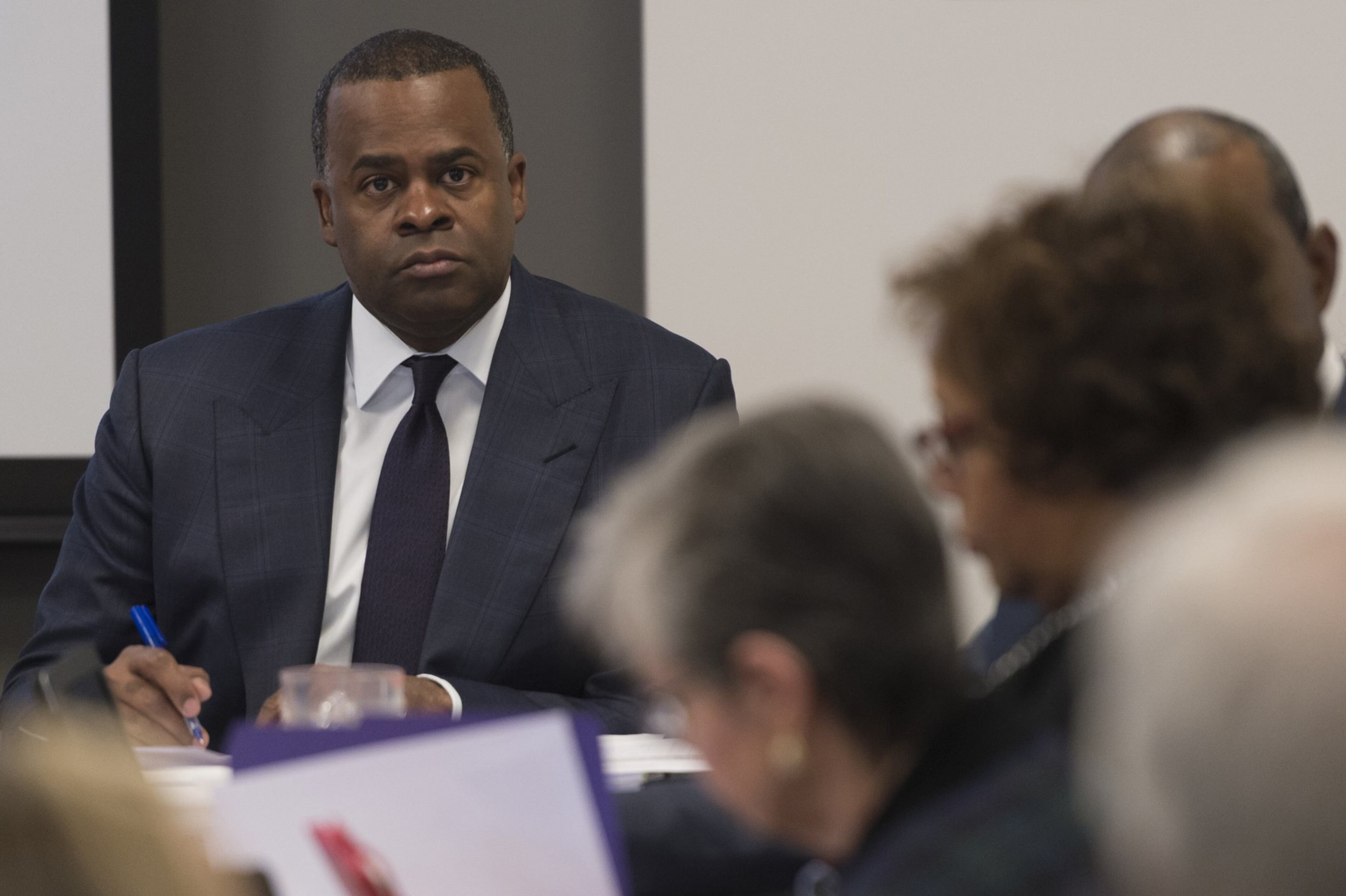Kasim Reed looms over crowded race to succeed him as Atlanta mayor

In three months, Atlanta Mayor Kasim Reed will be leaving the office he’s occupied for eight years. But he’s no lame duck, fading from the spotlight.
And he’s certainly not keeping to himself his thoughts about the candidates vying to replace him.
City Council President Ceasar Mitchell? "A disaster." City Councilwoman Mary Norwood? "Light work." Former City Council leader Cathy Woolard? "A quitter."
And don't get him started on Vincent Fort. "One of the most disappointing human beings I've ever seen," he said about the former state senator, whom he once dubbed "Wile E. Coyote" because he "never wins."
The outgoing mayor has battered and bruised many of the leading candidates who will face off in a Nov. 7 election that many consider a test of Reed’s influence. Depending on who wins, the transition could be a very strained — or at least incredibly awkward — one.
Even the two candidates he seems to gravitate toward — his former chief operating officer, Peter Aman, and Councilwoman Keisha Lance Bottoms — have been targets of his criticism.
"Let's be real clear," Reed told one radio interviewer, "nobody running for mayor could beat me."
Though prohibited by term limits from running for a third straight term, Reed has very much so staked out a role for himself in the race.
“What I will do is defend the record of my administration,” he told The Atlanta Journal-Constitution, “which I think is as strong as any other administration.”
And any candidate looking to gain ground in the election by attacking Reed’s policies, be warned.
The current mayor won’t hesitate to counter punch.
A sign-stealing scandal
Four over-sized signs outside the mayor’s second floor office at City Hall served as an example of Reed’s willingness to mix it up with those who criticize or question the current administration during campaign season.
They were first displayed at an Aug. 31 press conference called by the mayor after Mitchell started pushing for a moratorium on approving certain city contracts. Mitchell said he worried that some deals that won’t expire until 2018 were being “pushed through” during Reed’s final days.
The signs questioned Mitchell’s own ethics, with one proclaiming that he had paid the “second-highest ethics fines” of any sitting elected official in city government.

The foam boards were put away after the press conference. But, when an anonymous ethics complaint was filed accusing the Reed administration of abusing government resources by crafting the signs, they were placed in the City Hall atrium, in plain view of anyone coming out of City Council offices.
After someone absconded with the signs, police examined surveillance video and later arrested a man identified by Mitchell’s campaign as a volunteer. Reed’s office made sure the public knew who was responsible — issuing a press release announcing the arrest and where it took place.
Mitchell might be a favorite Reed antagonist, but he’s far from the only one.
He once bet a reporter a dozen doughnuts that Fort wouldn't qualify for the race, doubting that he'd commit to what Reed has frequently predicted would be a doomed campaign.
The mayor's office dubbed Cathy Woolard's campaign a failure after she knocked his decision to use taxpayer funds to renovate Philips Arena. And his spokeswoman penned a take-down of former Fulton County chairman John Eaves, who had asserted that Reed "let the Braves slip away to Cobb County."
“The best part about him quitting his job as the quasi-leader of Fulton County is that he will no longer be involved in public service once he loses his ill-fated race for Mayor of Atlanta,” read the statement from Reed spokeswoman Anne Torres.
Reed told the AJC that he’s responding to criticisms the candidates have lobbed against his administration, from his handling of the Braves’ move to budget decisions.
“If it were up to me, they’d run the race against the people who were running,” the mayor added. “It’s one of the reasons this race hasn’t crystallized. They’ve been too focused on me, and most people view the job I’ve done as pretty favorably. It’s not going to stick. It’s not going to work.”

He seems to particularly relish taking aim at Norwood, whom he defeated in 2009 by roughly 700 votes. In that contest and in this one, he’s sought to paint her as a closet Republican, even as she dubs herself the only true independent in the race.
With recent polls showing Norwood atop the crowded field, Reed has warned she could win a likely December runoff against a weak candidate. In one release, his office said Norwood would spend “30 days hammering” Mitchell over alleged ethics complaints if he nabs the No. 2 spot.
The ethics fines involved administrative errors, and not accusations of corruption, Mitchell’s camp has said.
Reed “is doing everything he can to divert and deflect attention away from the fact that he is the mayor during a time of what could be one of the most explosive corruption investigations … in the history of this city,” Mitchell said, referring to the ongoing federal cash-for-contracts investigation at City Hall.
A doctored photo
So who is Reed rooting for? The mayor hasn’t endorsed any candidate, but he’s gravitated toward three of them.
The first is Aman, a former Atlanta chief operating officer who enjoyed a warm relationship with the mayor. The second is Bottoms, who remains one of his most loyal allies on the city council. She benefited from a fundraiser he hosted for her earlier this year.
Their friendship was pilloried earlier this month in a flier circulated around City Hall showing Reed giving the councilwoman a piggy-back ride in a doctored photo that suggested the two had been intimate.
Bottoms, for her part, called the fliers “misogynistic and incredibly insulting” and said she doesn’t need to trade on anyone else’s name to win.
“I have a 20-plus year professional career, including being a judge, a lawyer and all the things I have done on the City Council,” she said. “For someone to try to belittle my accomplishments is upsetting.”
City Councilman Kwanza Hall also has been largely spared from Reed’s rhetorical broadsides.
The candidates who have faced Reed’s fury have responded with indignation or indifference.
Fort, for one, accused Reed of being more interested in the “needs of billionaire sports team owners than in the needs of our neighborhoods.”
Eaves lamented that the mayor hasn’t taken a “collegial posture” with the candidates.
“It’s a relay race and, even if the baton is not gracefully handed off to me, I’m still going to get the baton and I’m going to run as fast as I can go,” Eaves said. “My job is to run that leg of the race — that term that I will be assuming. Everybody will benefit from it.”
And then there’s Mitchell, who said he would act with “dignity and honor” but questioned why Reed is “acting in anger, or seeming in anger, around certain issues.”
“I think Mayor Reed has done a great job in certain ways for our city, and there’s no way around that. And that’s something I would never, ever try to ignore,” he said. “Even when personal insults are hurled my way, I’m still going to rise above that. I have no ill will toward the mayor, and he’s got enough fish to fry on his own.”
‘The fourth quarter’
Reed isn’t the first recent Atlanta mayor to refuse to stay on the sidelines when it comes to deciding his successor.
Then-Mayor Ivan Allen Jr. had a notoriously testy relationship with Sam Massell, his vice-mayor who decided to run for the office. Massell won convincingly, only to face his own divisive contest against vice-mayor Maynard Jackson four years later.
“In office, there were times when there were frictions between us. But you have to remember that he started on a much more conservative level than I did,” said Massell, who later made amends with Allen.

Jackson wholeheartedly endorsed Andrew Young to succeed him in 1981, branding Young’s leading rival a danger to African-American progress.
Shirley Franklin, meanwhile, largely stayed out of the 2009 fight to replace her, only endorsing Reed the day before the general election. They had their own tortured history: Reed ran Franklin's two campaigns for mayor, but the relationship later went south.
Reed’s fiery responses to critics may be his way of keeping rivals from tarnishing his legacy much as he did to Franklin’s once he entered office.
After he was elected mayor, Reed complained he had inherited a city in woeful financial condition. Though he didn’t reference Franklin by name, he complained about the city being left with reserves of only about $7 million and pension liabilities that loomed as a financial disaster.
Relations got so strained that the 2013 municipal elections contained a proxy fight between an incumbent councilman backed by Reed in H. Lamar Willis versus a challenger backed by Franklin. Franklin’s candidate, Andre Dickens, won.
As she follows local politics today, Franklin said in her blog, she's "amazed by the complete and utter dismissal of the contributions" of other mayors.
“The best among us had an extra dose of humility and compassion for the people they served,” Franklin wrote. “Mayor Reed has his accomplishments, which will be judged by history and not by press releases, official pronouncements or political polls. All of us have that same fate.”
Longtime City Hall watchers are astounded by how deeply Reed has waded into the race, but said he has every right to try to preserve his policies.
“He wants them to all be fully tested and fully vetted because, from his perspective, he literally wants the best person sitting behind that desk when he gets up from it,” said Michael Leo Owens, an Emory University political scientist.
As mayor, he has a bully pulpit bigger than any other in the city. But he also has a big stake in the outcome, Owens said.
“When people like me write books on black politics and cities,” Owens said, “we’re not going to dwell on his personality. We’re going to dwell on the decisions he made and the substantive things he brought to the city of Atlanta. He understands that.”
To some, Reed’s brash style can be grating. Mike Koblentz, chairman of the Northwest Community Alliance neighborhood group, said he gives Reed high marks for leadership, but his lack of respect toward opponents is a disappointment.

“I really hope in this election that people take temperament into account,” Koblentz said. “I think Reed has done some good things as mayor and was a strong Democrat nationally, but his temperament to me has been completely unacceptable.”
Sue Heerin, a Druid Hills resident who attended a recent mayoral forum, said Reed’s bickering with his would-be successors is unusual — until you consider the heated rhetoric from Washington, D.C.
“It’s an awkward way to lead up to a public vote,” she said. “But the times are so strange today.”
The winner of the race for mayor, Reed said, will be handed the reins to a city with a growing population, a string of economic development deals completed or in the works and a healthy financial balance sheet.
“If they have a problem with me because of that, that’s their own deal,” Reed said, vowing that he’s going to close out his term an an “upbeat and happy and optimistic” note.
“I’m not just sitting over there dusting. We’re working on some things that are pretty big swan songs,” he said. “This is my fourth quarter, and I’m going to play like it’s the fourth quarter.”
Why the Atlanta mayor’s race is worth knowing
The next mayor will impact all of metro Atlanta, and the economy of the Southeast. In our series Election 2017, we examine how a lack of affordable housing means fewer new companies – and new jobs – moving here.
Visit Politically Georgia at http://www.myajc.com/georgia-politics/
MYAJC.COM: REAL JOURNALISM. REAL LOCAL IMPACT.
AJC Business reporter J. Scott Trubey keeps you updated on the latest news about economic development and commercial real estate in metro Atlanta and beyond. You'll find more on myAJC.com, including these stories:
- Atlanta-based Equifax hit with massive data breach
- Atlantic Station owners planning for next phase
- Will Falcons' new stadium drive more development to downtown Atlanta?
Never miss a minute of what's happening in local business news. Subscribe to myAJC.com.




